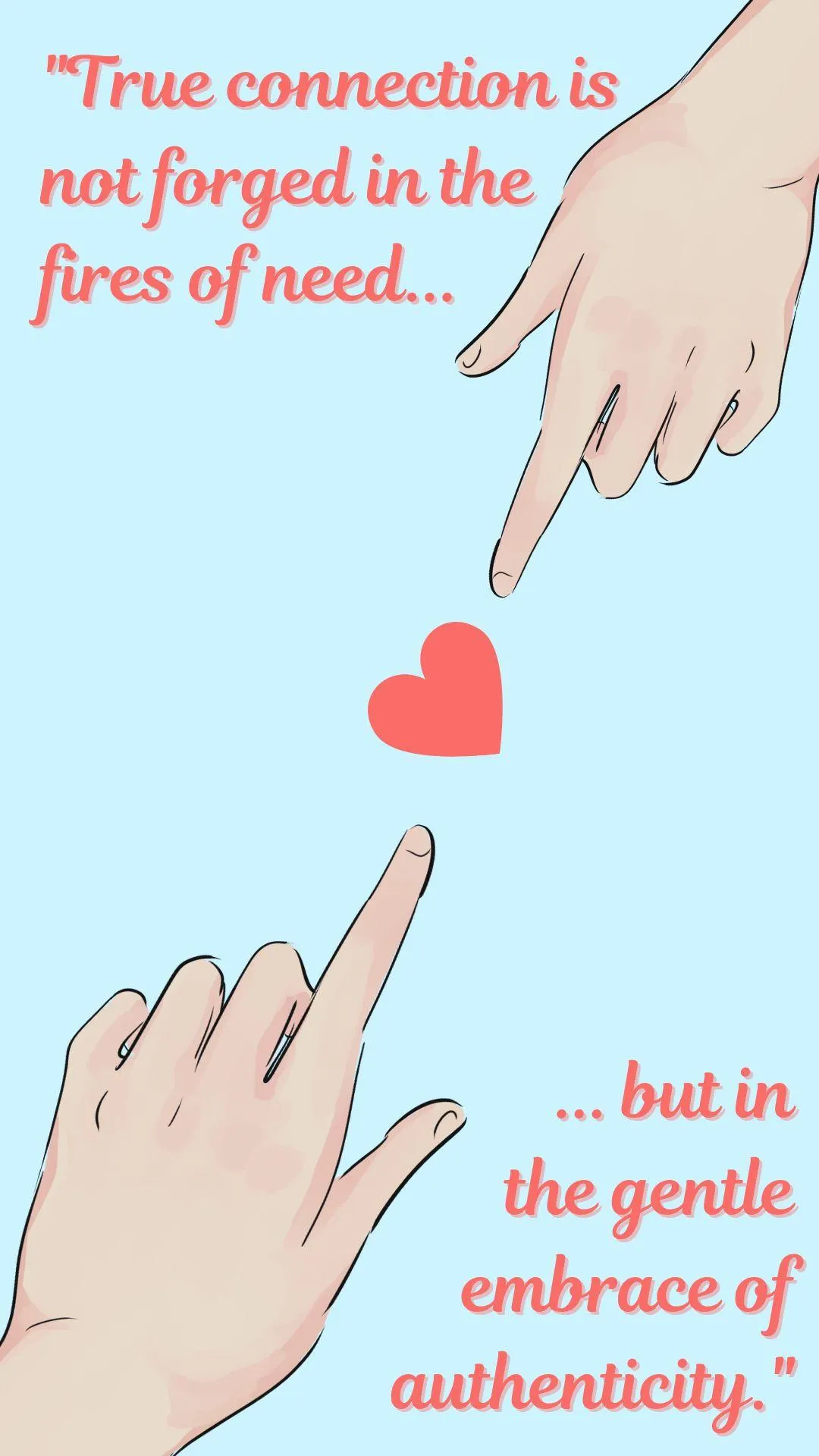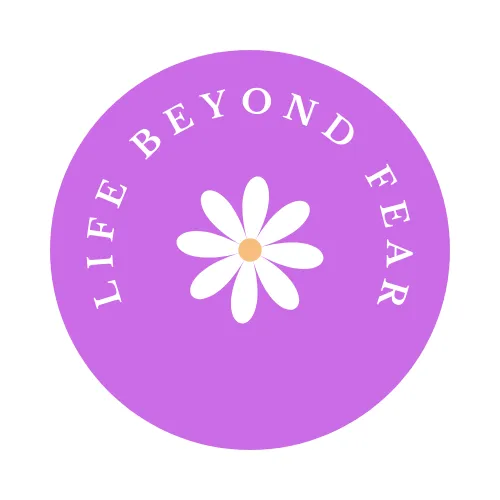There’s a whole world out there
See Newest Blogs

Finding Fulfillment Beyond Need: A Journey to Genuine Connection
Finding Fulfilment Beyond Need: A Journey to Genuine Connection
The Unseen Chains of Being Needed
Imagine stepping into a room filled with people, yet feeling invisible.
A whisper in your mind echoes: "You only matter if you're needed." It's a haunting notion that has woven itself into the fabric of many relationships, forcing transactions of utility rather than embracing authenticity.
How often do we construct relationships on the premise of need, equating "needed" with "wanted"?
This distortion not only skews personal connections but feeds a cycle of emotional scarcity, perpetuated by the fear of being unworthy when stripped of utility.

A Desperate Transaction
In relationships founded on the idea that we must offer something—be it beauty, wealth, or skills—we lose sight of authentic connection. These transactional dynamics suggest that without offering value in some measurable way, there's no place for us in someone’s life. This belief system clouds our authentic selves and limits the depth of our bonds, reducing them to mere exchanges. Yet, true relationships thrive beyond transactional needs, grounded in the simplicity of being, stripped of obligations of benefit or fulfilment of roles.
The Subtlety of the Need to be Needed
At the heart of our relational dynamics lies a subtle, often unconscious, drive: the need to be needed. This inclination typically camouflages itself as selflessness or devotion but may mask deeper insecurities rooted in our past experiences and self-image. When we lean into being needed rather than honestly expressing who we are and what we truly need, we inadvertently construct a façade that ultimately does disservice to both ourselves and our partners. These dynamics can arise from early conditioning where our worth was entangled with being useful or indispensable, thus leading us to seek such validation in our adult relationships.
Reimagining Relationship Dynamics
Genuine connection stems from seeing and valuing each other as we truly are. It's not built through obligation or reciprocal usefulness but through mutual respect and understanding. This requires courage—to present our unvarnished selves and to welcome others in their full humanity. The absence of transactional necessity fosters a space where love and support aren't conditional but freely given; where we feel worthy, not because we bring anything specific to the table, but simply because we are.
Hidden Needs and Resentment
The more we hide our true needs behind the veil of being essential, the greater the potential for resentment to simmer beneath the surface. Unvoiced needs, coupled with unmet expectations, can create emotional undercurrents that slowly erode the trust and intimacy within a relationship. When our genuine desires are consistently suppressed, and we prioritise being needed, we risk becoming strangers to our own emotions, fostering bitterness against those we claim to care for most. This resentment, unaddressed, can subtly corrode the foundation of what is cherished and good, casting a shadow over even the brightest aspects of a relationship.
The Interplay of Trauma and Relationships
Delving deeper, the brain-mind-body loop offers insights into how past trauma can trigger relational dynamics. Trauma often imprints on our psyche, creating patterns where being needed becomes synonymous with safety or acceptance. When these memories are triggered, they can activate our fight, freeze, fawn or flight response, leading us to seek validation through being needed, thus repeating unhealthy cycles.
Breaking free from these ingrained patterns demands awareness and healing. By acknowledging that these transactional inclinations arise from past wounds, we can approach our trauma not as a burden but as a compass guiding us towards healing and authentic connections. Practices such as mindfulness, therapy, and self-exploration can unlock this potential, freeing us from the constraints of being needed to feel worthy.
The Cost of Betraying One's Needs
Betraying one’s needs in favour of being indispensable can profoundly compromise the relationship's integrity. When subconscious motivations remain unaddressed, they can steer behaviours in ways that are disingenuous, leading to a facade of connection rather than authentic bonding. This constant compromise not only strains personal authenticity but also undermines mutual respect and trust. Over time, the relationship may transform into a battlefield of unmet needs and unexposed truths, as partners distance themselves emotionally, unable to bridge the gap of unspoken words and hidden intentions.
In bringing these patterns into consciousness, it’s crucial to reflect on how our internal narratives shape our actions and connection with others. Embracing this awareness allows for the reformation of our relationships, transforming them from transactions of need to sanctuaries of acceptance and genuine connection. Only by acknowledging and articulating our own needs can we collaborate with our partners to foster bonds that honour both individuality and togetherness.
Awakening to Our Needs
The journey to understanding and voicing our needs begins with introspection and a commitment to vulnerability. By actively engaging in self-reflection, individuals can start identifying underlying motivations and patterns that have remained obscured. Such awakening invites us to confront our fears and challenge the narratives that have led us to favour need over authenticity. This process paves the way for more open communication, where expressing our needs becomes an act of courage and compassion, aligning our relationships with truth and integrity.
Crafting Authentic Bonds
Transitioning away from relationships forged out of necessity requires intention and vulnerability. It involves:
1. Self-Reflection: Evaluate your current relationships. Are they reciprocal and nurturing, or are they subtly transactional?
2. Open Communication: Encourage conversations that honour emotions and perspectives without expectations of gain or utility.
3. Healing Exercises: Engage in practices that help realign the mind-body connection, aiding in the disentanglement of trauma from current relational patterns.
4. Building Community: Surround yourself with individuals who appreciate authenticity, creating a network of support where mutual existence is celebrated.
Embracing Wholeness
True belonging arises from peace with our inherent worth, irrespective of external validation. When we journey toward authentic relationships, we embrace a wholeness that doesn't rely on transactional identities but thrives on unconditional connections. It is in this space of acceptance and genuine love that we find not only fulfilment but also liberation, transcending the need to be needed.
This shift requires courage and a departure from familiar patterns, but as we commit to living and loving authentically, we pave the path to deeper, more meaningful relationships—not defined by necessity but cherished for their simplicity and sincerity.
Reflection
Self-Identity and Relationships: Reflect on a time when you felt your value in a relationship was tied to what you could offer rather than who you are. How did that dynamic impact your sense of self-worth, and what steps can you take to nurture relationships that honour your true identity beyond transactional exchanges?
Healing from Transactional Patterns: Consider a relationship where you felt the need to be needed. What fears or past experiences might have influenced this perspective, and how can you embrace healing practices to cultivate healthier, more authentic connections in the future?

Copyright ©LifeBeyondFear.Org. All Rights Reserved.
Unlock the secrets to improving relationships at work, at home, and most importantly, with yourself. Discover the transformative power of meaningful connections and self-understanding.
